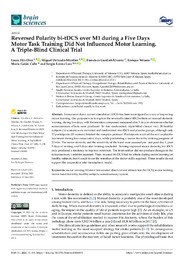Por favor, use este identificador para citar o enlazar este ítem:
https://hdl.handle.net/11000/34185Registro completo de metadatos
| Campo DC | Valor | Lengua/Idioma |
|---|---|---|
| dc.contributor.author | Flix Díez, Laura | - |
| dc.contributor.author | Delicado Miralles, Miguel | - |
| dc.contributor.author | Gurdiel-Álvarez, Francisco | - |
| dc.contributor.author | Velasco Serna, Enrique | - |
| dc.contributor.author | Galán Calle, María | - |
| dc.contributor.author | Lerma Lara, Sergio | - |
| dc.contributor.other | Departamentos de la UMH::Patología y Cirugía | es_ES |
| dc.date.accessioned | 2024-12-23T12:56:18Z | - |
| dc.date.available | 2024-12-23T12:56:18Z | - |
| dc.date.created | 2021-05-25 | - |
| dc.identifier.citation | Brain Sciences. 2021 May 25;11(6):691 | es_ES |
| dc.identifier.issn | 2076-3425 | - |
| dc.identifier.uri | https://hdl.handle.net/11000/34185 | - |
| dc.description.abstract | Transcranial direct current stimulation (tDCS) has been investigated as a way of improving motor learning. Our purpose was to explore the reversal bilateral tDCS effects on manual dexterity training, during five days, with the retention component measured after 5 days to determine whether somatosensory effects were produced. In this randomized, triple-blind clinical trial, 28 healthy subjects (14 women) were recruited and randomized into tDCS and placebo groups, although only 23 participants (13 women) finished the complete protocol. Participants received the real or placebo treatment during five consecutive days, while performing a motor dexterity training program of 20 min. The motor dexterity and the sensitivity of the hand were assessed pre- and post-day 1, post 5 days of training, and 5 days after training concluded. Training improved motor dexterity, but tDCS only produced a tendency to improve retention. The intervention did not produce changes in the somatosensory variables assessed. Thus, reversal bi-tDCS had no effects during motor learning on healthy subjects, but it could favor the retention of the motor skills acquired. These results do not support the cooperative inter-hemispheric model. | es_ES |
| dc.format | application/pdf | es_ES |
| dc.format.extent | 19 | es_ES |
| dc.language.iso | eng | es_ES |
| dc.publisher | MDPI | es_ES |
| dc.rights | info:eu-repo/semantics/openAccess | es_ES |
| dc.rights | Attribution-NonCommercial-NoDerivatives 4.0 Internacional | * |
| dc.rights.uri | http://creativecommons.org/licenses/by-nc-nd/4.0/ | * |
| dc.subject | Motor learning | es_ES |
| dc.subject | Bilateral transcranial direct current stimulation (bi-tDCS); | es_ES |
| dc.subject | Motor training | es_ES |
| dc.subject | Motor hand dexterity | es_ES |
| dc.subject | Healthy subjects | es_ES |
| dc.subject | Somatosensory system | es_ES |
| dc.title | Reversed Polarity bi-tDCS over M1 during a Five Days Motor Task Training Did Not Influenced Motor Learning. A Triple-Blind Clinical Trial | es_ES |
| dc.type | info:eu-repo/semantics/article | es_ES |
| dc.contributor.institute | Institutos de la UMH::Instituto de Neurociencias | es_ES |
| dc.relation.publisherversion | https://doi.org/10.3390/ brainsci11060691 | es_ES |

Ver/Abrir:
Reversed Polarity bi-tDCS over M1 during a Five Days Motor Task Training Did Not Influence Motor Learning. A Triple-Blind Clinical Trial.pdf
2,64 MB
Adobe PDF
Compartir:
 La licencia se describe como: Atribución-NonComercial-NoDerivada 4.0 Internacional.
La licencia se describe como: Atribución-NonComercial-NoDerivada 4.0 Internacional.
.png)